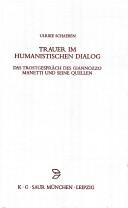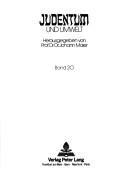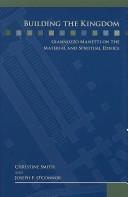| Listing 1 - 10 of 16 | << page >> |
Sort by
|
Book
Year: 1968 Publisher: Köln ; Graz : Bohlau Verlag,
Abstract | Keywords | Export | Availability | Bookmark
 Loading...
Loading...Choose an application
- Reference Manager
- EndNote
- RefWorks (Direct export to RefWorks)
Book
ISBN: 9780674243934 0674243943 0674243935 9780674238350 0674238354 Year: 2019 Publisher: Cambridge, MA
Abstract | Keywords | Export | Availability | Bookmark
 Loading...
Loading...Choose an application
- Reference Manager
- EndNote
- RefWorks (Direct export to RefWorks)
A celebrated orator, historian, philosopher, and statesman, Giannozzo Manetti (1396-1459) was one of the most remarkable figures of the Italian Renaissance. As contemporaries noted, his intellectual versatility--including an interest in architecture--linked him to Leon Battista Alberti, the renowned "universal man" of the Renaissance. Like Alberti, Manetti wrote in both Latin and Italian, and made new translations of canonical texts such as Aristotle, thus replacing the faulty medieval renderings that were the mainstay of Scholastic thought. A pious Christian, he translated the New Testament from Greek into Latin, thus challenging the centuries-old Vulgate; and he was the first scholar since Jerome to translate the Psalms from the original Hebrew. To forestall possible critics, he penned a treatise expounding his philological methods in translating scripture. Delivered over the course of nearly twenty years, his addresses to magistrates, commanders, princes, and popes furnish a vivid picture of Quattrocento politics and diplomacy. This authoritative biography, the first in any modern language, both describes chronologically the events of his extraordinary career, and analyzes his numerous and wide-ranging writings, which confirm Manetti's status as an exemplar of the spirit of the Italian Renaissance. -- Provided by publisher
Humanists --- Manetti, Giannozzo, --- Manettus, Jannotius --- Humanistes --- Manetti, Giannozzo
Book
Year: 1983 Publisher: Roma Edizioni di storia e letteratura
Abstract | Keywords | Export | Availability | Bookmark
 Loading...
Loading...Choose an application
- Reference Manager
- EndNote
- RefWorks (Direct export to RefWorks)
Book
ISSN: 0393845X ISBN: 9788895996486 Year: 2014 Publisher: Venezia : Istituto veneto di Scienze, Lettere ed Arti,
Abstract | Keywords | Export | Availability | Bookmark
 Loading...
Loading...Choose an application
- Reference Manager
- EndNote
- RefWorks (Direct export to RefWorks)
Manetti, Giannozzo, --- Critique et interprétation --- Correspondance --- Manetti, Giannozzo --- Critique et interprétation. --- Correspondance.

ISBN: 3598777337 3110951681 9783598777332 Year: 2002 Volume: 181 Publisher: München Saur
Abstract | Keywords | Export | Availability | Bookmark
 Loading...
Loading...Choose an application
- Reference Manager
- EndNote
- RefWorks (Direct export to RefWorks)
Ist Trauer ein Ergebnis sozialer Konventionen, entspringt sie gar der Einbildung des Betroffenen, oder liegt sie vielmehr in der Natur des Menschen? Dieser existenziell bedeutsamen Frage geht der Renaissance- Autor Giannozzo Manetti in seiner Schrift Dialogus consolatorius nach und spannt dabei den Bogen von der antiken Tradion über die christliche Trostliteratur hinüber in seine eigene Zeit, in der ein Paradigmenwechsel stattfindet. Manetti qualifiziert die Trauer als natürliche, wesentlich zum Menschsein gehörige Empfindung und hält ein mutiges Plädoyer für die emotionale Emanzipation des Menschen. Kern der vorliegenden Untersuchung ist eine eng an den zugrundeliegenden Quellen orientierte Kommentierung des Dialoges , die besonders den epocheübergreifend interessierten Altphilologen anspreichen wird. Die Übersetzung des lateinischen Textes im Anhang der Arbeit macht die Argumentation Manettis für Leser aller Fachrichtungen nachvollziehbar. Am Ende der Arbeit steht ein Versuch, dem Renaissance-Text im Blick auf die Trauertheorien der modernen Psychologie einen aktuellen Bezug zu verleihen und vergleichbare Erfahrungen aufzuzeigen, die Betroffene in der Ausnahmesituation des Trauerfalls in allen Zeiten durchleben. Neben Sach- und Personenregister erleichtert eine ausführliche Einleitung zur Gattungsgeschichte und zur Wirkungszeit den Zugang zum Thema.

ISBN: 3820491279 Year: 1987 Publisher: Frankfurt am Main Lang
Abstract | Keywords | Export | Availability | Bookmark
 Loading...
Loading...Choose an application
- Reference Manager
- EndNote
- RefWorks (Direct export to RefWorks)
Judaism --- Hebrew philology --- History. --- Manetti, Giannozzo, --- -Hebrew philology --- -Jews --- Religions --- Semites --- Jews --- History --- Religion --- Manetti, Giannozzo --- -Manetti, Giannozzo --- -Contributions in Hebrew philology --- Contributions in Judaism --- -History --- Manettus, Jannotius, --- Manettus, Jannotius

ISBN: 9780866983624 0866983627 Year: 2006 Publisher: Tempe, Ariz.: ACMRS,
Abstract | Keywords | Export | Availability | Bookmark
 Loading...
Loading...Choose an application
- Reference Manager
- EndNote
- RefWorks (Direct export to RefWorks)
"Building the Kingdom" examines how Giannozzo Manetti (1396-1459), by interpreting the great architectural projects of his day within historical, literary, and spiritual contexts, articulated their relevance for his contemporaries as cultural paradigms of the Early Italian Renaissance. Manetti, wealthy, learned, devout, and politcally active, was perhaps the most admired lay thinker of his generation, a leader within the new intellectual currents of his native Florence and prominent in Rome at the court of Pope Nicholas V (1447-1455). Manetti's detailed accounts both of the consecration of Florence Cathedral in 1439 ("De secularibus et pontificalibus pompis" [Concerning the Secular and Pontifical Parades]) and of the ambitious building projects planned by Nicholas for a revival of papal splendor in Rome (book 2 of his "Life of Nicholas V Supreme Pontiff") are among the most elaborate architectural ekphrases of the fifteenth century. In these, he surpasses his better known rival, Leon Battista Alberti. These important Latin texts are presented here in new critical editions, with English translations and commentaries, preceded by chapters situating them within Manetti's other writings, his vast redaing, and his historical moment. A close reading of the texts, coupled with an in-depth examination of the sites described and the ceremonies conducted there, shows how Manetti's distinctive fusion of Scholastic and Humanist ideas became authoritative for an Early Renaissance understanding of the cultural and spiritual power of buildings.

ISBN: 0674011341 Year: 2003 Volume: 9 Publisher: Cambridge (Mass.) Harvard university press
Abstract | Keywords | Export | Availability | Bookmark
 Loading...
Loading...Choose an application
- Reference Manager
- EndNote
- RefWorks (Direct export to RefWorks)
Manetti, Giannozzo --- Biografie --- Biographie --- Biographies --- Biography --- History--Biography --- Life histories --- Memoirs --- Biography. --- History --- Auxiliary sciences of history --- Genealogy
Book
ISBN: 9780674974975 0674974972 Year: 2017 Volume: 79 Publisher: Cambridge, Massachusetts ; London, England Harvard University Press
Abstract | Keywords | Export | Availability | Bookmark
 Loading...
Loading...Choose an application
- Reference Manager
- EndNote
- RefWorks (Direct export to RefWorks)
Manetti's Latin treatise Adversus Iudaeos et Gentes (Against the Jews and Gentiles) offers a polemical defense of the Christian religion. This volume, which includes the first four books, surveys human history from the Creation to the life, teaching, and resurrection of Christ. Book I begins with the creation and fall of man in the Biblical account. There follows a long digression adversus gentes (the Gentiles, i.e., pagans), which reviews central points of ancient Greek and Roman philosophy and religion, and censures the ancients for their senseless doctrines and bloody rites. Manetti then returns to the Jews, whose beliefs and practices are praised from Abraham to Moses. During their centuries of "true" piety, Manetti calls the chosen people "Hebrews." But from the time of the Exodus onwards, he censures them as "Jews" because they observe the absurd and cruel practices of Pentateuchal legislation, which he views as analogous to pagan rites. Manetti stresses several themes in Jewish history: the early development of the concept of righteousness, the Exodus, the Mosaic Law and its inadequacy--thus providing a "preparation for the Gospel" in Eusebius' sense. The next three books provide a synoptic biography of Jesus in three stages. Book II describes the life of Christ up to the raising of Lazarus; Book III relates his teaching, and Book IV offers an account of Christ's passion, death, and resurrection.--
Christian philosophy. --- Jewish philosophy. --- Philosophy, Ancient. --- Christentum. --- Judentum. --- Philosophie. --- Manetti, Giannozzo, --- Manettus, Iannotius, --- Bible --- Criticism, interpretation, etc., Christian.
Book
ISBN: 3598776047 3519076047 Year: 1994 Volume: 55 Publisher: Stuttgart : Teubner,
Abstract | Keywords | Export | Availability | Bookmark
 Loading...
Loading...Choose an application
- Reference Manager
- EndNote
- RefWorks (Direct export to RefWorks)
Man (Theology)
---
Philosophical anthropology
---
Humanists
---
#BIBC:ruil
| Listing 1 - 10 of 16 | << page >> |
Sort by
|

 Search
Search Feedback
Feedback About UniCat
About UniCat  Help
Help News
News